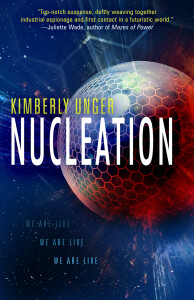 Nucleation by Kimberly Unger is a science fiction novel that attempts to deal with everything from possible first contact, to nanomachines, to corporate espionage and personal rivalries. This would make the book seem overpacked in other hands, yet is quite effective overall. Indeed, the iclusion of many scientific concepts in this book is impressive (although the plot lends itself perhaps a little too well to a sequel).
Nucleation by Kimberly Unger is a science fiction novel that attempts to deal with everything from possible first contact, to nanomachines, to corporate espionage and personal rivalries. This would make the book seem overpacked in other hands, yet is quite effective overall. Indeed, the iclusion of many scientific concepts in this book is impressive (although the plot lends itself perhaps a little too well to a sequel).
The protagonist is a profesional remote operator of drones (called Waldos in the book) named Helen Vectorvitch. She is serious about her job, and not particularly good at communicating with other people or playing the corporate political games that are all too common in any such setting. On the other hand, her technical skill is second to none, and Helen manages to prove this even in the opening pages, which show she expects to have to deal with a great many complicated
On a mission to ready an object known as the “golf ball” for proper use during a large project involving building a jumpgate capable of allowing spaceships to traverse it. She notes tiny little details that do not seem to match up with the parameters, albeit in very small ways. These problems continue to become more obvious as she finds a number of large sections of the object to be missing, possibly having been destroyed. She also spots an unfamiliar type of nanomachine around the time a strange whistling sound comes through her feed. When her navigator fails to reply, Helen finds that she has to pull out of the operation and disconnect from her waldo at short notice, leaving the entire operation with a mess of jumbled data and Ted, her longtime navigation partner, dead. This rocks her far more than anything else
A major rival comes in the form of Catherine Beauchamp, another operator with a bit of a nasty streak. She almost immediately begins spreading rumors about Helen and subtly or not so subtly trying to turn various navigators and staff members against her. Almost immediately another navigator assigned to her essentially blows the mission, and in the process succeeds in tipping his hand as to what influence he is under. It is one of many little signs of the depths Beauchamp might sink to for a career advancement, yet the question dangles as to whether there is more going on than simple professional rivalry.
Of course, these two are far from the only characters in the book. Hellen still has friends in the company, an old associate named Keller and the doctor working to help her recover from the sudden mission disconnect to start, being just the two most obvious examples. The fact her data was so clearly jumbled leads to a set of debriefings, and her initial reaction to the situation makes Helen feel exceptionally relatable, down to combining unique computer skills with having a traumatic reaction to somewhat terrifying effect.
A number of science-fiction concepts appear in the book, including old standbys such as nanotechnology and possible extraterrestrial contact. These are the most focused upon of those elements, and arguably the most ‘hard’ science fiction; however, a number of other such tropes appear as well.
On the question of hard vs. soft scifi, where this book might fall will depend heavily on the reader’s opinion of one particular element of the story. That is, how feasible they find the idea of artificial wormholes as a means of travel over extremely long distances. It is made clear that Transportation past a certain distance is largely performed using this method, with gates constructed by the waldo remote control drones. While the element is well-used, its status as matter of fact in comparison to other elements will be noted by a reader.
On the level of social commentary, there is less change from the present. The concerns of a company relate back to the varied rivalries and to a lesser extent, dealing with government interference and the risk of asset seizure. The power balance isn’t significantly different than what one might find in many 21st century nations, or culturally on the planet as a whole. Still, it is not exaggerated enough to seem to serve as satire, merely another element of the setting.
This volume ends almost, if not outright, on a cliffhanger. While effective, the fact the complications related to the discoveries in the book have just been discovered than resolved may leave readers feeling conflicted. On one side the book is well written, engaging, and features enjoyable characters and ideas. On the other the book feels like it the first part of a series, to the point that every major element of danger is unresolved.
Overall, Nucleation is an intelligently written story that manages to combine a number of serious scientific concepts with sociological ones as well. The fact that the Helen is engaging enough to keep the reader invested contributes well. The ending might leave a little to be deaired for some, yet the overall volume is still charming.
(Tachyon 2020)
